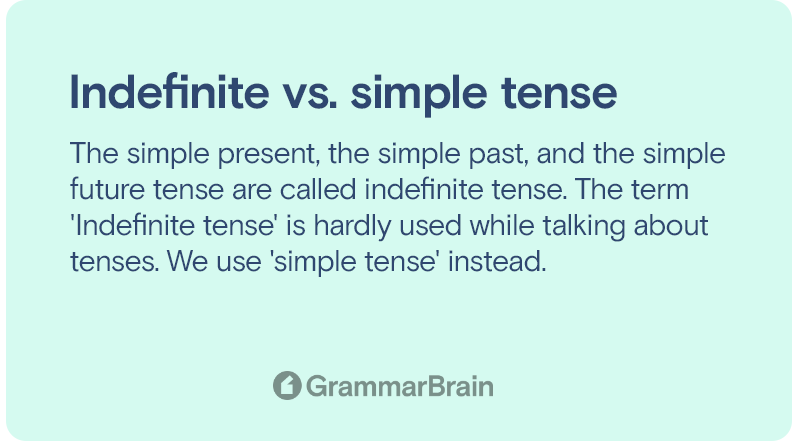What is the indefinite tense? Tenses are used in English to denote action with reference to the time of speech. It lets you know if the action is going on or completed when you are speaking. Different tenses are formed using verbs with or without the helping verbs in a sentence. While there are many forms of tenses, our focus in this article is on the indefinite tense.

What is indefinite tense?
The simple present, the simple past, and the simple future tense are called indefinite tense. The term ‘Indefinite tense’ is hardly used while talking about tenses. We use ‘simple tense’ instead.
Simple tense or indefinite tense is used to state habitual actions or universal truths or facts. It does not specify if the action is complete or happening at the time of speech.
Definition of Indefinite Tense
When any verb is in the simple present, simple past or simple future tense, it is said to be indefinite tense. It expresses facts, routine actions, universal truths, and habitual actions without specifying if the action is completed or going on.
How does indefinite tense work?
Indefinite tense can be written in present, past, and future tense forms. The present indefinite tense talks about habitual actions, universal truths, and routines. The past indefinite tense talks about work that happened in the past. The future indefinite work talks of action to take place in the future.
How to use indefinite tense
Now that you know how indefinite tense works, let us see how it works in all these forms one by one.
Present indefinite tense (Simple present tense)
Present indefinite tense is quite simple as it takes the root form of the verb. When we write sentences in the third person singular form, the regular verb takes an ‘s’ with it. Simple examples of present indefinite tense are given below that help you understand better.
Present Indefinite Tense Examples in First Person
- I talk. (singular)
- We talk. (plural)
Present Indefinite Tense in the Second person
- You talk.
Present Indefinite Tense in the Third person
- He talks. (singular)
- She talks. (singular)
- They talk. (plural)
In the examples above, we add an ‘s’ to the verb in the third-person singular case. If we use irregular verbs ending with ch, x, sh, ss, or o, we add ‘es’ or ‘ies’ when it ends with ‘y’.
Indefinite Tense Examples
As mentioned above, indefinite tense can also be used in the past and future tense. But they are not as complicated as the present indefinite tense. Let us see some examples of these two tenses.
Simple Past Tense or Past Indefinite Tense Examples
- I won the match.
- You rang the bell.
- He played football.
Simple Future Tense or Future Indefinite Tense Examples
- We will see the movie.
- You will ring the bell.
- She will sing a song.
Verbs in Indefinite Tense
We will take one single verb and see how it is used in different indefinite tenses.
Present Tense
- I (we, you, they) play every day.
- He (she) plays every day.
Past Tense
- You (I, we, he, she, and they) played yesterday.
Future Tense
- I (we, you, she, he, they) will play tomorrow.
Forming Verbs in the Indefinite Tense
Forming verbs in Indefinite Tense is easy.
Present Tense
It is the easiest as it takes verbs in the root form.
- Subject + root form of the verb.
- I play chess.
Past Tense
- Subject + root form of the verb+ed
- We cleaned the room.
Future Tense
- Subject + will + root form of the verb.
- You will go to school.
FAQs
When do we use the present indefinite tense?
Together with habitual actions, routines, and universal truths, we also use the present indefinite tense when something is scheduled in the future to talk about nature, actual events, etc.
What is the difference between simple present tense and present indefinite tense?
There is no difference between the two. They can be used interchangeably.
Are all the verbs in the present indefinite tense in the root form?
No, the third-person singular verbs take different forms depending on the verb. A regular verb takes an ‘s’ at the end. An irregular verb ending with ss, ch, sh, o, x, takes ‘es’ at the end and ‘ies’ in a verb ending with ‘y’ in the end and having a consonant before ‘y’.
Inside this article
Fact checked:
Content is rigorously reviewed by a team of qualified and experienced fact checkers. Fact checkers review articles for factual accuracy, relevance, and timeliness. Learn more.
Core lessons
Glossary
- Abstract Noun
- Accusative Case
- Anecdote
- Antonym
- Active Sentence
- Adverb
- Adjective
- Allegory
- Alliteration
- Adjective Clause
- Adjective Phrase
- Ampersand
- Anastrophe
- Adverbial Clause
- Appositive Phrase
- Base Form
- Body Paragraph
- Clause
- Compound Adjective
- Complex Sentence
- Compound Words
- Compound Predicate
- Common Noun
- Comparative Adjective
- Comparative and Superlative
- Compound Noun
- Compound Subject
- Compound Sentence
- Copular Verb
- Collective Noun
- Colloquialism
- Conciseness
- Consonance
- Conditional
- Concrete Noun
- Conjunction
- Conjugation
- Conditional Sentence
- Comma Splice
- Correlative Conjunction
- Coordinating Conjunction
- Coordinate Adjective
- Cumulative Adjective
- Dative Case
- Determiner
- Declarative Sentence
- Declarative Statement
- Direct Object Pronoun
- Direct Object
- Diction
- Diphthong
- Dangling Modifier
- Demonstrative Pronoun
- Demonstrative Adjective
- Direct Characterization
- Definite Article
- Doublespeak
- Equivocation Fallacy
- En Dash
- False Dilemma Fallacy
- Future Perfect Progressive
- Future Simple
- Future Perfect Continuous
- Future Perfect
- First Conditional
- Gerund
- Gerund Phrase
- Genitive Case
- Homophone
- Homonym
- Helping Verb
- Irregular Adjective
- Irregular Verb
- Imperative Sentence
- Indefinite Article
- Intransitive Verb
- Introductory Phrase
- Indefinite Pronoun
- Indirect Characterization
- Interrogative Sentence
- Intensive Pronoun
- Inanimate Object
- Indefinite Tense
- Infinitive Phrase
- Interjection
- Intensifier
- Infinitive
- Indicative Mood
- Juxtaposition
- Linking Verb
- Modal Verb
- Modifier
- Misplaced Modifier
- Nominative Case
- Noun
- Noun Adjective
- Oxymoron
- Object Pronoun
- Object Complement
- Order of Adjectives
- Participle
- Parallelism
- Prepositional Phrase
- Past Simple Tense
- Past Continuous Tense
- Past Perfect Tense
- Past Progressive Tense
- Present Simple Tense
- Present Perfect Tense
- Personal Pronoun
- Personification
- Persuasive Writing
- Parallel Structure
- Phrasal Verb
- Predicate Adjective
- Predicate Nominative
- Phonetic Language
- Plural Noun
- Punctuation
- Punctuation Marks
- Preposition
- Preposition of Place
- Parts of Speech
- Possessive Adjective
- Possessive Determiner
- Possessive Case
- Possessive Noun
- Proper Adjective
- Proper Noun
- Present Participle
- Prefix
- Predicate
- Quotation Marks
- Relative Pronoun
- Reflexive Pronoun
- Reciprocal Pronoun
- Subordinating Conjunction
- Simple Future Tense
- Syntax
- Stative Verb
- Subjunctive
- Subject Complement
- Subject of a Sentence
- Sentence Variety
- Second Conditional
- Suffix
- Superlative Adjective
- Slash Symbol
- Topic Sentence
- Types of Nouns
- Types of Sentences
- Uncountable Noun
- Verb
- Verb Tense
- Vowels and Consonants



